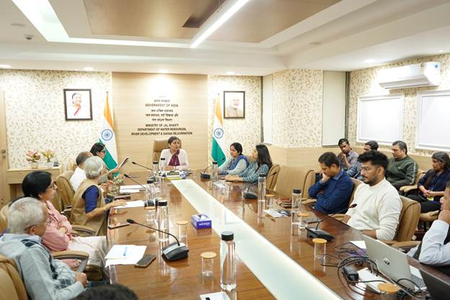Water resources department educates staff against sexual harassment at workplace
New Delhi, Nov 21 (IANS) Looking to foster a gender-sensitive and equitable work environment, the Department of Water Resources, River Development and Ganga Rejuvenation (DoWR, RD and GR) organised an awareness workshop on the Prevention of Sexual Harassment (POSH) Act, 2013, an official said on Friday.
The programme, held under the Chairpersonship of Economic Adviser and Chairman, Internal Complaints Committee (ICC), included a presentation on the provisions of the POSH Act by Janvi Satpal Babbar, Advocate and External Member of ICC, said the official from the Union Ministry of Jal Shakti.
This programme aimed to equip employees of DoWR, RD and GR with a deeper understanding of not only the legal provisions of the Act but also its broader purpose — to promote a culture of dignity and equality at the workplace, said an official statement.
According to a 2024 report, a staggering 40 per cent of working women experiencing workplace insecurity are unaware of the protective measures offered by the Prevention of Sexual Harassment (POSH) Act.
The report by Walchand Plus emphasised the urgent need for a transformative approach to ensure workplace safety.
Only 42 per cent of employees possess a thorough understanding of the POSH Act, revealed the report.
This lack of awareness among employees, as highlighted by the research, underscores the imperative for enhanced education on the Act’s provisions.
The report also exposed prevalent misconceptions within organisations, where compliance with the Act is often seen as a mere checkbox rather than a genuine commitment to fostering a safe environment for women.
Surveys indicate that 53 per cent of HR professionals were confused about the Act.
Furthermore, the research found that HR managers were concerned about the underrepresentation of women and the tendency to downplay harassment issues within senior management.
“As a woman, I feel India still has a long way to go when it comes to bridging gender disparity. In many ways, we’re still a patriarchal society. Protecting women at the workplace should be a basic expectation, but unfortunately, many organisations treat this at a very cosmetic level,” said a representative of Walchand PeopleFirst, in a statement.
The research revealed that, owing to constraints such as a lack of senior women representation in Internal Complaints Committees (ICCs), among many others, there is much to be desired when it comes to the implementation and adherence to the provisions of the POSH Act.
It also underscored the crucial role of training sessions that go beyond legal literacy, addressing procedural aspects and fostering a preventive culture.
The report urged a proactive response from organisations, advocating for immediate measures to address the gaps identified.
The POSH Act, 2013, was enacted in line with the Supreme Court’s landmark Vishaka judgment to ensure a safe, secure and dignified workplace for women.
The Act provides a comprehensive legal framework to prevent, prohibit and redress incidents of sexual harassment, clearly defining the offence and outlining the responsibilities of employers to ensure compliance.
It mandates the establishment of ICCs in organisations with 10 or more employees and emphasises not only a structured redressal mechanism but also proactive measures such as awareness, sensitisation and capacity-building.
Through these provisions, the Act seeks to foster a gender-sensitive, respectful, and equitable work environment for all employees.
–IANS
rch/dpb



Comments are closed.